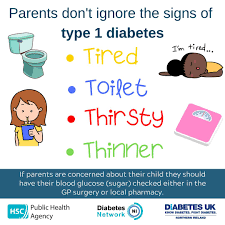Diabetes
Diabetes is a lifelong condition that causes a person’s blood sugar (glucose) level to become too high.
There are two main types of diabetes. Type 1 diabetes is the most common type of diabetes in children and young people. Type 2 diabetes is usually seen in adults but more young people are developing it.
The symptoms of Diabetes are THE 4 T'S:
- Toilet — Going to the toilet a lot to pass urine, bed wetting by a previously dry child or heavier nappies in babies. Getting up in the night to go to the toilet.
- Thirsty — Being really thirsty and not being able to quench the thirst. Your child may ask for a drink more often, finish drinks very quickly or you may notice they generally drink more.
- Tired — Feeling more tired than usual. Having less energy than normal, not playing as often, less energy for sports.
- Thinner — Losing weight or looking thinner than usual.
You may also notice your child getting more infections than usual especially fungal infections like thrush.
If you are concerned your child may have diabetes speak to your GP (or call 111 if they are closed) urgently today. They will be able to check your child’s blood sugar level with a finger prick blood test.

Type 1 diabetes
- Type 1 diabetes is an autoimmune condition in which the body’s own defence system (immune system) attacks the cells in the pancreas which produce insulin.
- We do not know what causes type 1 diabetes. It is not linked to lifestyle factors.
- There is no cure and it cannot be prevented.
- Type 1 diabetes is managed with injections of insulin.
Type 1 diabetes can develop quickly over days or weeks. It is important for diabetes to be diagnosed and treated urgently, to prevent children and young people becoming seriously unwell.
Type 1 diabetes is not common in children and is not always considered when children see a health professional.
If you think your child may have diabetes ask your GP to do a finger prick and urine test. If these results suggest diabetes they will be sent to the hospital the same day to see a paediatrician.
Type 2 diabetes
- Type 2 diabetes is where the body’s cells do not react to insulin or the body does not make enough insulin.
- It is not an autoimmune condition.
- There are several risk factors for developing type 2 diabetes. These include ethnicity, genetics and lifestyle.
- You can help prevent and manage type 2 diabetes with healthy eating, regular exercise and achieving a healthy body weight.
- Tablets and insulin injections may also be needed to manage type 2 diabetes.
- Type 2 diabetes can develop over weeks or months. The symptoms may be less obvious compared to type 1 diabetes.
NHS Talking Therapies
NHS Talking Therapies Services for Anxiety & Depression (formerly known as IAPT), is a free primary care service providing short term, change orientated psychological treatment for people presenting with mild to moderate depression and specific anxiety disorders. This can include: OCD, specific phobias, panic, Post Traumatic Stress Disorder, Generalised Anxiety Disorder, health anxiety, social anxiety, low mood and anxiety in the context of a long term physical health condition (e.g. diabetes) and medically unexplained symptoms.
The treatments provided by NHS Talking Therapies Services for Anxiety & Depression are primarily Cognitive Behavioural Therapy (CBT) and Counselling. We offer NICE recommended therapies within the stepped care model.
It must be noted that these therapies are only available for ages 16+
To access NHS Talking Therapies Services for Anxiety & Depression you need to be registered with a GP surgery, then based on the GP surgery you are registered with in the Frimley ICB will mean you are eligible to self refer or ask for a professionally referral to be made to one of the services below:
- TalkPlus covering GP surgeries in North East Hampshire & Farnham and from age 16 plus.
- NHS Berkshire Talking Therapies covering GP surgeries in Berkshire and from age 17 plus
- NHS Talking Therapies Services for GP surgeries in Surrey and all from age 17 plus and include Mind Matters Surrey
- Dorking Healthcare (DHC) Talking Therapies
- Centre for Psychology
Resources
For further information on diabetes



